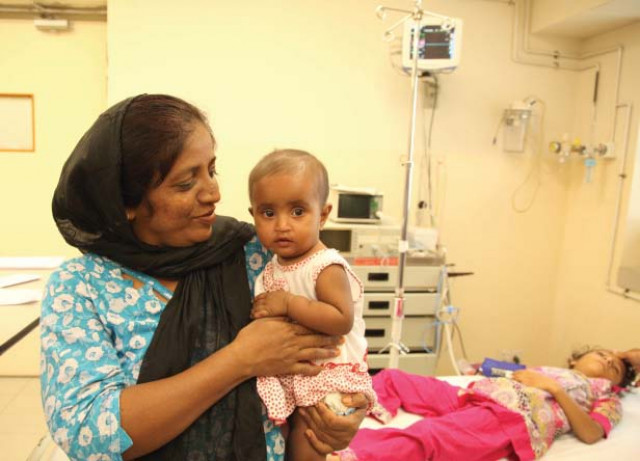Affordable healthcare: At Indus Hospital, being the change you want to see
Disillusioned by the public healthcare system, hospital founders took matters in their own hands.

“I have worked with government hospitals in Karachi for a long time and have seen the level of corruption that takes place there,” Dr Aziz, a founding member of Indus Hospital, told The Express Tribune. “It is useless to work for institutions that do not value human lives. Thus, I decided to build a hospital that will treat the underprivileged free of cost.”
Spread over 21-acres, Indus Hospital’s four-storey building is located in Karachi’s densely populated Korangi area. The hospital, which relies mainly on Zakat and donations but refuses to be called a ‘charity’ hospital, has treated more than 600,000 people since July 2007 free of cost.
The hospital has no cash counters and iron plates engraved on walls clearly state that the hospital does not charge its patients and asks people to report to the administration anyone caught asking for payments. “We came up with the concept of a free hospital in 1982 but it took several years to build it as doctors were busy travelling in search of a career,” he says.
“In 2005, we finally managed to acquire land from the Islamic Mission Hospital on one condition: that the hospital will provide free services,” Aziz says.
The next challenge was construction.
“On Monday, I had Rs32,000 in my bank account. I needed Rs100,000 to pay to a contractor, lined up for Saturday, for construction to begin,” he relates. On Friday, the courageous team sat on the barren land, trying to think of how they would pay the contractor when a man walked over to them, with an envelope in his hands. Refusing to disclose his identity, he handed it over to the group and left.
“When I opened the brown envelope, it contained Rs200,000. The man had probably been observing us for a couple of days,” Dr Aziz speculates.
Since then, donations worth at least Rs43 million have been spent without disclosing identities of donors.
The hospital, however, does not solely rely on Zakat and donations and is also funded by philanthropists. For instance, artist Jimmy Engineer donated some of his paintings. The hospital’s chief executive officer, Dr Abdul Bari Khan, also acknowledges the government’s support to the venture.
The hospital has done well for itself in terms of building a reputation.
“At a monthly average of 15,000 patients, we are handling the largest number of emergency cases in the country,” a management official of the hospital Aaliya Rahim Bondrey said.
Despite the daily increasing number of emergency cases, there is no chaos or panic, Bondrey claims. “Patients are efficiently treated on a priority-based system designed according to the Manchester Triage Scheme widely followed by hospitals worldwide,” she said.
Since 2007, the hospital has performed more than 10,000 surgeries and also completed more than 10,000 dialysis sessions. It has provided premium health solutions completely free to more than 551,538 patients across Pakistan.
Published in The Express Tribune, August 25th, 2011.



















COMMENTS
Comments are moderated and generally will be posted if they are on-topic and not abusive.
For more information, please see our Comments FAQ